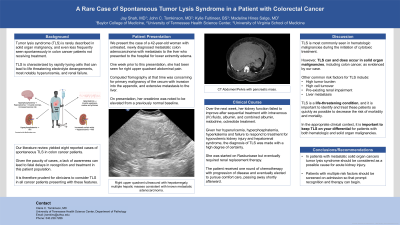Sunday Poster Session
Category: Colon
P0308 - A Rare Case of Spontaneous Tumor Lysis Syndrome in a Patient With Colorectal Cancer
Sunday, October 22, 2023
3:30 PM - 7:00 PM PT
Location: Exhibit Hall

Has Audio
- JT
John Tomkinson, MD
University of Tennessee Health Science Center
Memphis, TN
Presenting Author(s)
Jay S. Shah, MD1, John C. Tomkinson, MD2, Kylie Fultineer, BS3, Madeleine Hines Salge, MD1
1Baylor College of Medicine, Houston, TX; 2University of Tennessee Health Science Center, Memphis, TN; 3University of Virginia School of Medicine, Charlottesville, VA
Introduction: Tumor lysis syndrome (TLS) is rarely described in solid organ malignancy, and even less frequently seen spontaneously in colon cancer patients not receiving treatment. TLS is characterized by rapidly lysing cells that can lead to life threatening electrolyte derangements, most notably hyperuricemia, and renal failure. Our literature review yielded eight reported cases of spontaneous TLS in colon cancer patients. Given the paucity of cases, a lack of awareness can lead to fatal delays in recognition and treatment in this patient population. It is therefore prudent for clinicians to consider TLS in all cancer patients presenting with these features.
Case Description/Methods: We present the case of a 42 year old woman with untreated, newly diagnosed metastatic colon adenocarcinoma with metastasis to the liver who presented to the hospital for lower extremity edema. One week prior to this presentation, she had been seen for right upper quadrant abdominal pain. Computed Tomography was concerning for primary malignancy of the cecum with invasion into the appendix, and extensive metastasis to the liver. On presentation, her creatinine was noted to be elevated from a previously normal baseline. Over the next week, her kidney function failed to improve after sequential treatment with intravenous (IV) fluids, albumin, and combined albumin, midodrine, octreotide treatment. Given her hyperuricemia, hyperphosphatemia, hyperkalemia and failure to respond to treatment for hypovolemic kidney injury and hepatorenal syndrome, the diagnosis of TLS was made with a high degree of certainty. She was started on Rasburicase but eventually required renal replacement therapy. The patient received one round of chemotherapy with progression of disease and eventually elected to pursue comfort care, passing away shortly afterward.
Discussion: TLS is most commonly seen in hematologic malignancies during the initiation of cytotoxic treatment. Common risk factors for TLS include the above, as well as high tumor burden, high cell turnover, and pre-existing renal impairment. Liver metastasis is also a less commonly recognized risk factor that is emerging. In patients with metastatic solid organ cancers tumor lysis syndrome should be considered as a possible cause for acute kidney injury. Patients with multiple risk factors should be screened on admission so that prompt recognition and therapy can begin.
Disclosures:
Jay S. Shah, MD1, John C. Tomkinson, MD2, Kylie Fultineer, BS3, Madeleine Hines Salge, MD1. P0308 - A Rare Case of Spontaneous Tumor Lysis Syndrome in a Patient With Colorectal Cancer, ACG 2023 Annual Scientific Meeting Abstracts. Vancouver, BC, Canada: American College of Gastroenterology.
1Baylor College of Medicine, Houston, TX; 2University of Tennessee Health Science Center, Memphis, TN; 3University of Virginia School of Medicine, Charlottesville, VA
Introduction: Tumor lysis syndrome (TLS) is rarely described in solid organ malignancy, and even less frequently seen spontaneously in colon cancer patients not receiving treatment. TLS is characterized by rapidly lysing cells that can lead to life threatening electrolyte derangements, most notably hyperuricemia, and renal failure. Our literature review yielded eight reported cases of spontaneous TLS in colon cancer patients. Given the paucity of cases, a lack of awareness can lead to fatal delays in recognition and treatment in this patient population. It is therefore prudent for clinicians to consider TLS in all cancer patients presenting with these features.
Case Description/Methods: We present the case of a 42 year old woman with untreated, newly diagnosed metastatic colon adenocarcinoma with metastasis to the liver who presented to the hospital for lower extremity edema. One week prior to this presentation, she had been seen for right upper quadrant abdominal pain. Computed Tomography was concerning for primary malignancy of the cecum with invasion into the appendix, and extensive metastasis to the liver. On presentation, her creatinine was noted to be elevated from a previously normal baseline. Over the next week, her kidney function failed to improve after sequential treatment with intravenous (IV) fluids, albumin, and combined albumin, midodrine, octreotide treatment. Given her hyperuricemia, hyperphosphatemia, hyperkalemia and failure to respond to treatment for hypovolemic kidney injury and hepatorenal syndrome, the diagnosis of TLS was made with a high degree of certainty. She was started on Rasburicase but eventually required renal replacement therapy. The patient received one round of chemotherapy with progression of disease and eventually elected to pursue comfort care, passing away shortly afterward.
Discussion: TLS is most commonly seen in hematologic malignancies during the initiation of cytotoxic treatment. Common risk factors for TLS include the above, as well as high tumor burden, high cell turnover, and pre-existing renal impairment. Liver metastasis is also a less commonly recognized risk factor that is emerging. In patients with metastatic solid organ cancers tumor lysis syndrome should be considered as a possible cause for acute kidney injury. Patients with multiple risk factors should be screened on admission so that prompt recognition and therapy can begin.
Disclosures:
Jay Shah indicated no relevant financial relationships.
John Tomkinson indicated no relevant financial relationships.
Kylie Fultineer indicated no relevant financial relationships.
Madeleine Hines Salge indicated no relevant financial relationships.
Jay S. Shah, MD1, John C. Tomkinson, MD2, Kylie Fultineer, BS3, Madeleine Hines Salge, MD1. P0308 - A Rare Case of Spontaneous Tumor Lysis Syndrome in a Patient With Colorectal Cancer, ACG 2023 Annual Scientific Meeting Abstracts. Vancouver, BC, Canada: American College of Gastroenterology.
